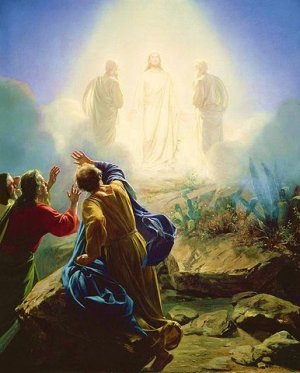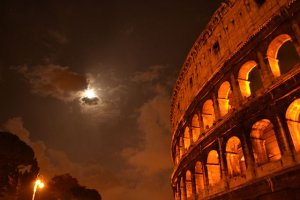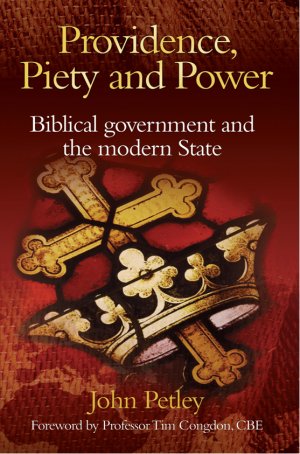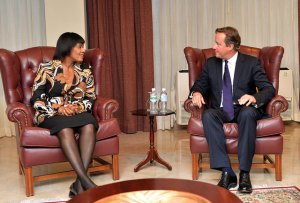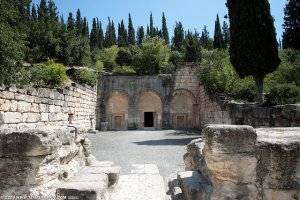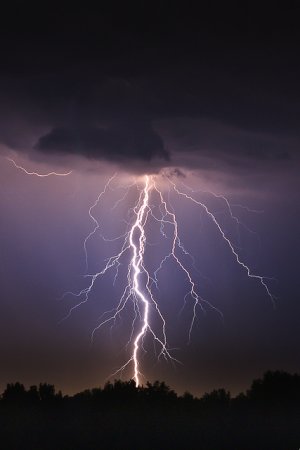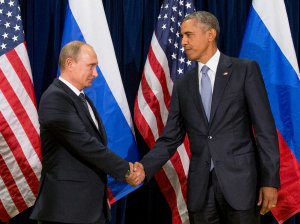Prophecy
Frances
A Prophet Like Moses
Moses prophesied that a prophet like himself would one day be raised up by the Lord. This prophecy was fulfilled in Jesus – but does it end there?
It was Moses who prophesied that the Lord would raise up a prophet like himself, a prophet descended from the race of Israel who would be given God's words to proclaim. As one authorised to speak in God's name he would do so with divine authority, and God promised that he would punish anyone who refused to obey his message.
This provision was made when, on Mount Sinai, the people begged Moses that they would not again have to listen to God himself or to behold his fiery presence. God commended them for this request and promised instead that he would raise up in their nation a prophet who would mediate God's word to them (Deut 18:16-19).
God's Alternative to the Occult
The promise to send another prophet like Moses was (and is) given as an alternative to seeking guidance and help through witchcraft and spiritualism:
Don't let your people practise divination or look for omens or use spells or charms, and don't let them consult the spirits of the dead. The Lord your God hates people who do these disgusting things...in the land you are to occupy, people follow the advice of those who practise divination and look for omens, but the Lord your God does not allow you to do this. Instead, he will send you a prophet like me...and you are to obey him (Deut 18:10-15).
God's views do not change with the passing of time. He is still absolutely opposed to witchcraft, spiritism and any other kind of occult practices. Those who do these things arouse his anger. Such steps are in any case, unnecessary for his people because he has made provision for their guidance and well-being through the prophet like Moses.
God's Promise Fulfilled
The promise of God to send a prophet like Moses was fulfilled in two ways. Every time a prophet emerged in the course of Israel's history he would be seen to be the fulfilment of God's promise through Moses, even if only partially. Speaking to those who had witnessed the healing of the lame man at the Beautiful Gate of the temple, Peter referred to God's promise of a prophet like Moses and saw its fulfilment in "all the prophets from Samuel on, as many as have spoken" (Acts 3:22-24).
An oft-repeated question down the years was, "Are you the prophet?", the question that was asked concerning John the Baptist and Jesus himself (John 1:21-25, Matt 16:14).
None of the succession of prophets that brought God's word to Israel down the years completely fulfilled Moses' promise - until the coming of Jesus. They spoke the words God gave them to speak, but he was the word, the complete speaking forth of the word of God. "In the past God spoke to our forefathers through the prophets at many times and in many ways, but in these last times he has spoken to us by his Son..." (Heb 1:1-2).
None of the prophets through the years completely fulfilled Moses' promise – until Jesus. The prophets spoke the words of God - he WAS the Word of God.
After the crowd had witnessed the miraculous feeding of 5000 people they drew the conclusion, "Surely this is the prophet who is to come into the world" (John 6:14). The sermons preached to the early church show that Peter and Stephen believed that Jesus was the complete fulfilment of God's promise to raise up a prophet like Moses (Acts 3:22-23; 7:37).
Jesus is Like Moses
There are a number of fascinating parallels between the life of Moses and that of Jesus. Their young lives were spared in infancy (Ex 2:9-10; Matt 2:13-14). They both renounced a royal court to share their brothers' sufferings (Acts 7:22-23; Phil 2:6-8). Both were said to be meek (Num 12:3; Matt 11:29). Both were said to be faithful (Heb 3:2). Both were men with the compassion of a shepherd (Num 27:17; Matt 9:36). Each had the supreme privilege of beholding the face of God (2 Cor 3:7-13; John 1:18).
They were the ministers of covenants (Deut 29:12; Heb 8:6). Their ministry was to reveal God's will to his people (Deut 6:1; Matt 5:21-48) but where his will had been rejected both had a mighty ministry of intercession on behalf of those people (Deut 9:18-19; Heb 5:7 and 7:25).
Those with a prophetic ministry today do well to cultivate the qualities revealed in this summary of the characteristics of Moses and, supremely, those of the "greater than Moses" (Heb 3:3). Among the prophets heard today there are too many who have forgotten the warning "if I have no love my speech is no more than a noisy gong or a clanging bell" (1 Cor 13:1).
There are many fascinating parallels between the lives of Jesus and Moses, including character qualities that those with a prophetic ministry today would do well to imitate.
Jesus Spoke Only God's Words
The most important characteristic of 'the prophet like Moses' that the Lord promised to raise up for his people is this: "I will put my words in his mouth and he will tell them everything I command him" (Deut 18:18).
Jesus claimed that the initiative in his speaking always came from the Father, and that he never opened his mouth to say what he wanted to say: "I do nothing on my own initiative but I speak these things as the Father taught me" (John 8:28). "For I did not speak on my own initiative, but the Father himself who sent me has given me commandment, what to say and what to speak" (NAS) or, as the NIV helpfully translates, "what to say and how to say it".
If it is still true that "man does not live on bread alone, but on every word that comes from the mouth of God" (Matt 4:4) (and we can be sure that the Lord has not changed his ideas on the subject), then we must face up to the fact that the well-being of God's people depends upon their regular attention to his word, spoken through his prophetic messengers.
It is still true that man does not live on bread alone, but on every word from the mouth of God. The well-being of God's people depends on their regular attention to his word.
How tragic that so many of the Lord's people have dished up every Sunday the latest theories and ideas currently being circulated in their particular group of churches; the experience and theories of their leadership or the latest humanistic conclusions of their Bible critics. God's people need his word spoken in the power of his Spirit, for there is no hope of their spiritual growth if this element is missing from their diet.
Jesus is THE Prophet
Although Moses' promise that God would raise up a prophet like him was partially fulfilled in the prophets subsequently sent to Israel and Judah, it was not until the coming of Jesus that Moses' promise was finally fulfilled. Those who heard him and watched what he was able to do came to the unanimous conclusion that he was THE promised prophet.
When Jesus raised the son of the widow of Nain from death: "They were all filled with awe and praised God. 'A great prophet has appeared among us' they said" (Luke 7:16). When Jesus rode into Jerusalem on a donkey "the whole city was stirred and asked 'Who is this?' The crowds answered 'This is Jesus the prophet from Nazareth in Galilee'" (Matt 21:10-11).
After Jesus' crucifixion two disconsolate followers journeying to Emmaus nevertheless said of him: "He was a prophet powerful in word and deed before God and all the people" (Luke 24:19). Later on a New Testament writer compares and contrasts Moses and Jesus. He declares them both to have been faithful but expresses the difference between them: "Moses was faithful as a servant in all God's house...but Christ is faithful as a son over God's house" (Heb 3:5-6).
Proclaiming God's Standards
If we ask the question 'What is a prophet?' we find many aspects calling for attention in order to reach a complete definition. One aspect which stands out in any study of Moses or Jesus as examples of what a prophet should be is that they took a courageous stand for God's standards. One answer to the question 'What is a prophet?' must therefore be 'someone who makes God's will known and who makes obedience possible'.
God's laws are not designed to make life as miserable as possible but to open our lives to the fullness of his blessing. Hear the heartbeat of God in the words: "Oh, that their hearts would be inclined to fear me and keep all my commands always, so that it might go well with them and their children forever!" (Deut 5:29).
God's laws are not designed to make life as miserable as possible, but to open our lives to the fullness of his blessing.
Prophets Like Moses Today
If a knowledge of God's standards and his will are the secret of his blessing in the church and in society as a whole, where are we to find those authorised to get the message over? There were prophets in the early church (e.g. Acts 11:28, 13:1-2, 15:32, 21:10). They were not office-bearers limited to one Christian community, neither were they elected to office or set apart by an ecclesiastical ceremony; they simply received a word from God and then proceeded to speak it wherever he sent them. They came and went as the Spirit moved them. The local church was required to test them and then to receive or reject their message.
The picture of these wandering prophets, unburdened by pastoral duties and uninvolved in ecclesiastical responsibilities, coming into a fellowship, speaking what God had given them to say and then departing elsewhere is one we need to recover today; that is, if we have the courage so to do.
Moses Spoke to the Nations
The word ecclesia is used in the Greek version of the Old Testament in Deuteronomy 18:16, where Moses refers to the 'church' of his day. What he said, however, was intended not just for a restricted community, but also, for all mankind.
In Old Testament days Nathan spoke to King David about his treatment of Bathsheba's husband (2 Sam 12:1-15); Elijah spoke about the way King Ahab and Queen Jezebel had appropriated Naboth's vineyard (1 Kings 21:17-29); Amos addressed the pampered women of Samaria who caused their husbands to oppress the poor so that they could sleep on ivory beds, over-eat and spend a fortune on beauty preparations (Amos 4:1 and 6:4-6); and Jonah was told to rebuke Nineveh (Jonah 1:2).
We accept that Old Testament prophets spoke the word of the Lord to rulers, cities and nations. Why then do prophets today operate almost exclusively in Christian circles?
In New Testament times, John the Baptist not only sought to prepare the hearts of the faithful for the coming Messiah but also rebuked Herod Antipas for his immorality and gave guidance to soldiers and tax-collectors (Luke 3:12-14, 19). We accept that Old Testament prophets spoke the word of the Lord to rulers, cities and nations. Why then are New Testament prophets today operating almost exclusively in Christian circles? In their day Chrysostom and Ambrose did not hesitate to speak God's word to emperors and others in authority. May God raise up prophets like Moses who will fearlessly declare God's standards to our rebellious, sick world.
First published in Prophecy Today, Vol 4 No 2, March/April 1988.
CIJ XXII: The Parting of the Ways: Two Distinct Communities
Clifford Denton looks at the growing distinction between Jewish and Christian communities in the first century AD, and the Roman persecution which propelled it.
In the last few studies we have reviewed the initial factors that disturbed the unity of the early Christian Church from its Hebraic heritage. This week we will consider how the parting of the ways was effected by the middle of the second century.
Recap
In Our Father Abraham, Dr Marvin Wilson summarises the factors that led to the early separation of the Christian Church from its Jewish roots:
- There was inevitable tension over the proclamation that Jesus was the expected Messiah, both in terms of Messianic expectation and of theological interpretation.
- Though one has to deal carefully with the reaction of the Synagogue, it seems wise to conclude that at first, there was only general resistance to Christians from this quarter, rather than total exclusion.
- The rising alternative Messianic expectations in the Jewish Revolts brought another element to separation. Followers of Jesus did not form an alliance with those in revolt against Rome, and so were further alienated from the general Jewish community.
- Meanwhile, the failure of the revolts brought catastrophe to the Jewish nation, the fall of the Temple and of the city of Jerusalem, the Diaspora, the rise of the Synagogues and the move to codify the Oral traditions and consolidate Judaism. Both Church and Synagogue were contributing to their parting of ways.
Understanding this early divergence and the separation which followed is not just a useful history lesson. It helps us to understand even the current situation relating to Christianity and Judaism - not so much to allocate blame, but to better appreciate what needs to be repaired in their relationship.
1st Century Jews and Christians differed because of their theologies, their Messianic expectations and the fallout from the Jewish revolts.
Growing Diversion
Clues to the degree of separation between the Christian Church and the Synagogue can be pieced together from available historical evidence. For example, a comment is made by the Roman historian Suetonius concerning a dispute between Jews and Jewish Christians in Rome in 49 AD. Claudius expelled both groups as if there were no distinction between them:
He banished from Rome all the Jews, who were continually making disturbances at the instigation of one Christus. (From Lives of the Twelve Caesars, Suetonias. Available as a Wordsworth Classic, 1997)
However, by the time of Nero in 64 AD, there was a distinction between Christians and Jews - and it was the Christians who were blamed by Nero for the burning of Rome. The 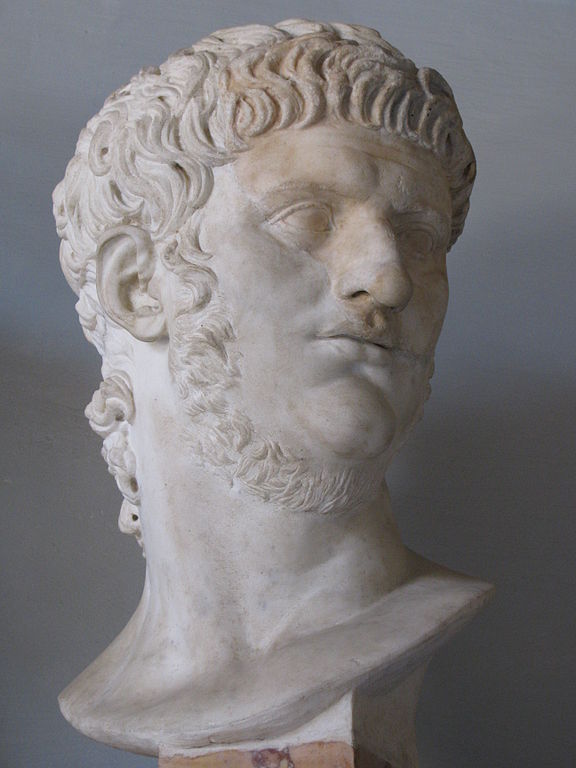
Disaster followed. Whether it was accidental or caused by criminal act on the part of the emperor is uncertain – both versions have supporters. Now started the most terrible and destructive fire which Rome has ever experienced. It began in the Circus, where it adjoins the Palentine and Caelian hills. Breaking out in shops selling inflammable goods, and fanned by the wind, the conflagration instantly grew and swept the whole length of the Circus...First, the fire swept violently over the level spaces. Then it climbed the hills...
Terrified, shrieking women, helpless old and young, people intent on their own safety, people unselfishly supporting invalids or waiting for them, fugitives and lingerers alike – all heightened the confusion. When people looked back, menacing flames sprang up before them or outflanked them. When they escaped to a neighbouring quarter, the fire followed – even districts believed to be remote proved to be involved...
The fire raged for several days and only four of Rome's fourteen districts remained intact. Nero looked for a scapegoat. Tacitus describes this clearly:
...neither human resources, nor imperial munificence, nor appeasement of the gods, eliminated sinister suspicions that the fire had been instigated. To suppress rumour, Nero fabricated scapegoats – and punished with every refinement the notoriously depraved Christians (as they were popularly called). Their originator, Christ, had been executed in Tiberius' reign by the governor of Judaea, Pontius Pilatus. But in spite of this temporary setback the deadly superstition had broken out afresh, not only in Judaea (where the mischief had started) but even in Rome. All degraded and shameful practices collect and flourish in the capital.
First, Nero had self-acknowledged Christians arrested. Then, on their information, large numbers of others were condemned – not so much for incendiarism as for their anti-social tendencies. Their deaths were made farcical. Dressed in wild animals' skins, they were torn to pieces by dogs, or crucified, or made into torches to be ignited after dark as substitutes for daylight. Nero provided his Gardens for the spectacle, and exhibited displays in the Circus, at which he mingled with the crowd – or stood in a chariot, dressed as a charioteer. Despite their guilt as Christians, and the ruthless punishment it deserved, the victims were pitied. For it was felt that they were being sacrificed to one man's brutality rather than to the national interest. [emphases added]
Thus, from descriptions of the flow of history we find that observers have given us evidence as to the timing of the separation between Jewish and Christian communities. Between the middle and end of the first century, this separation was becoming more noticeable – Jews and Christians were treated as two distinct groups. We now turn to another clue which will help us understand their growing divergence.
By the end of the first century AD, Jews and Christians were being treated as two separate communities.
From Sabbath to Sunday
In his extensive analysis, From Sabbath to Sunday (Pontifical Gregorian University Press, Rome, 1977), Samuele Bacchiocchi traces the details of when Christian celebrations of the Sabbath became Sunday meetings. This is a major clue to how far the Church had become separated from the Jewish community. His analysis confirms the view given by Wilson in Our Father Abraham that by the time of Justin Martyr (around 160 AD), "the parting of the way seems to be largely finalized" (p83).
Bacchiocchi notes that early Christians celebrated the Sabbath in the tradition of Judaism:
...analysis of the New Testament sources regarding the Jerusalem Church has firmly established that the primitive Christian community there was composed primarily of and administered by converted Jews who retained a deep attachment to Jewish religious customs such as Sabbath-keeping. It is therefore impossible to assume that a new day of worship was introduced by the Jerusalem Church prior to the destruction of the city in A.D. 70. We might add that in view of the enormous influence exerted on the Church at large by the Jewish Christian leadership and membership, it would have been practically impossible for any Church anywhere to introduce Sunday observance prior to A.D. 70. W.D. Davies, a well-recognized specialist on early Christianity, concisely and sagaciously summarizes the religious situation at the time:
'Everywhere, especially in the East of the Roman Empire, there would be Jewish Christians whose outward way of life would not be markedly different from that of the Jews. They took it for granted that the gospel was continuous with Judaism; for them the new covenant, which Jesus had set up at the Last Supper with his disciples and sealed by his death, did not mean that the covenant made between God and Israel was no longer in force. They still observed the feasts of Passover, Pentecost and Tabernacles; they also continued to be circumcised, to keep the weekly Sabbath and the Mosaic regulations concerning food. According to some scholars, they must have been so strong that right up to the fall of Jerusalem in A.D. 70 they were the dominant element in the Christian movement.' (p151, with a quote from WD Davies, Paul and Jewish Christianity, 1972. Emphases added)
Even up to 135 AD, despite the flight to Pella by Christians after the fall of Jerusalem, there is evidence of continued observance of the Jewish traditions among those in the Jerusalem congregations. Yet, various other factors gradually eroded this adherence to biblical custom. This seems particularly to be the case when Gentiles came to be the majority in the Christian Church and when congregations developed outside of the Land of Israel.
Bacchiocchi identifies trends in this way with the Church in Rome. We have rehearsed some of the historical factors regarding Christians and Jews in both Israel and Rome and the various pressures that were evident on these communities. Bacchiocchi concludes:
The introduction of Sunday worship in place of "Jewish" Sabbath-keeping- the latter being particularly derided by several Roman writers of the time – could well represent a measure taken by the leaders of the Church of Rome to evidence their severance from Judaism and thereby also avoid the payment of a discriminatory tax. (p173)
Christian Anti-Judaism
Bacchiocchi also identifies a broad range of Christian writers who wrote against the Jews in the second century:
...how different at that time was the attitude of many Christian writers towards the Jews! A whole body of anti-Judaic literature was produced in the second century condemning the Jews socially and theologically...
...The following list of significant authors and/or writings which defamed the Jews to a lesser or greater degree may serve to make the reader aware of the existence and intensity of the problem: 'The Preaching of Peter', 'The Epistle of Barnabus', Quadratus' lost 'Apology', Aristides' 'Apology', 'The Disputation between Jason and Papiscus concerning Christ', Justin's 'Dialogue with Trypho', Miltiades' 'Against the Jews' (unfortunately lost), Apollinarius' 'Against the Jews' (also perished), Melito's 'On the Passover', 'The Epistle to Diognetus', 'The Gospel of Peter', Tertullian's 'Against the Jews', Origen's 'Against Celsus'. (p179)
Justin, in particular, is singled out to demonstrate the issue:
The Sabbath to Justin is a temporary ordinance, derived from Moses, which God did not intend to be kept literally, for He Himself "does not stop controlling the movement of the universe on that day." He imposed it solely on the Jews as "a mark to single them out for punishment they so well deserved for their infidelities." The acceptance of this thesis makes God guilty, to say the least, of discriminatory practices, inasmuch as He would have given ordinances for the sole negative purpose of singling out the Jews for punishment.
Thus we can trace the general trend of Church leaders in the Gentile world, particularly in Rome, to react against their Jewish roots and to demonstrate this through ignoring the Sabbath day. This in turn led to Christians distinguishing themselves by meeting on the first day of the week instead. This was very clear by the middle of the second century.
The general trend amongst Church leaders in the Gentile world, and particularly in Rome, was to react against their Jewish roots.
Summary
In the years in which we now live, distant from the beginning of the new movement in the world of Judaism that came to be called Christianity, both Jews and Christians are looking back to discover how their ways parted. David Flusser, an eminent scholar of Judaism and the origins of Christianity, confirms the view that we have considered in this study:
The Jewish origin of Christianity is an historical fact. It is also clear that Christianity constituted a new community, distinct from Judaism. Thus, Christianity is in the peculiar position of being a religion which, because of its Jewish roots, is obliged to be occupied with Judaism, while a Jew can live his Jewish religious life without wrestling with the problems of Christianity.
From its very beginnings, Christianity understood itself more or less as the heir of Judaism and as its true expression, at the same time that it knew itself to have come into existence through the special grace of Christ. As the vast majority of Jews did not agree with their Christian brethren in this claim, Christianity became a religion of Gentiles to whom, from the second century on, it was forbidden to fulfill the commandments of the Law of Moses – a book which was, at the same time, a part of their Holy Scriptures.
Already then the majority of Christians thought that the Jewish way of life was forbidden even to those Jews who had embraced Christianity, an attitude which later became official in the Church. While anti-Semitism existed before Christianity, Christian anti-Judaism was far more virulent and dangerous. The latter rejected most of the motifs of Greco-Roman anti-Semitism, as these were used also against Christians, but invented new arguments. Most of these existed as early as the first century – some of them have their own roots already in the New Testament – and by the second century we can recognize more or less clearly the whole direction of Christian anti-Judaism. (pp617-618, Origins of Christianity, Magnes Press, 1988, emphases added)
The consequences of Christianity's severance from its roots are apparent not just in differences in community lifestyle but also in the bad fruit of anti-Semitism and anti-Judaism. This can be tracked back to the early days of the Christian Church in Jerusalem, gradually strengthening to a parting of the ways by the mid-second century. Wilson puts it this way in Our Father Abraham:
Although a few Jewish Christians apparently still attended synagogue in Jerome's day (ca. A.D. 400), the parting of the way seems to have been finalized by around the middle of the second century. By the time of Justin Martyr (ca. A.D. 160) a new attitude prevailed in the Church, evidenced by it appropriating the title "Israel" for itself. Until that time the Church had defined itself more in terms of continuity with the Jewish people; that is, it was an extension of Israel. (p83)
For Reflection and Comment
What can Christians do, without compromising the Gospel message, to restore the perception that disciples of Jesus are joined to the Israel of God?
Next time: Replacement Theology.
Review: Providence, Piety and Power
'Providence, Piety and Power' by John Petley (RoperPenberthy Publishing, 2012, 352 pages, available from the publisher for £14.99. Also available from the Telegraph bookshop and from Amazon)
This book, subtitled 'Biblical government and the modern State', argues that religion has a vital role to play in modern political and social affairs. The author, a former political researcher in Brussels, insists on the relevance of Scripture to current problems and maintains there is an overarching divine Providence watching over us and weighing us in the balance.
Biblical Perspective on Politics
Petley's main thesis is to question the size of the State, suggesting it has grown far too large, with a power and influence now well beyond its Biblical mandate. For instance, the belief than more and more state spending will in itself increase wealth and economic growth has led to "a far greater role for the state in managing a nation's economy than the Bible condones" (p241).
The author asks: how much should be entrusted to a State that does not espouse Biblical principles? In answering he often reverts back to Calvin's distinction between spiritual government and political or civil government. He would agree, for instance, that Government is "God's ordained method of restraining evil" (p82), something that is always necessary in a fallen world.
He would also allow the State a role in regulating commerce, to ensure greater fairness and honesty, and that it should legislate to protect the vulnerable in society, but "the actual caring process – feeding the hungry, nursing the sick and dying – is the responsibility of individuals and communities" (p48).
The author asks: how much should be entrusted to a State that does not espouse biblical principles?
Anti-Socialist
He firmly believes in smaller government, one which performs only those functions ordained for it in the Bible, rather than a 'nanny state' in charge from the cradle to the grave. The author is very much against socialism, something to be aware of when approaching his book. He claims that "the fundamental principles that undergird socialism are totally at odds with the Bible" (p173) and admits that "this book argues strongly that Christianity and socialism are incompatible" (p205).
Overall, his verdict on socialism's big state is one of constant failure as it is built upon a rejection of Biblical teaching. So - be prepared for political bias and controversial statements!
Petley has a strong anti-socialist agenda, and is a firm believer in small government.
Christian Worldview
But the author has genuinely looked for a Biblical perspective in current affairs and thoughtfully considered the development of Christian political thinking down the ages in order to use it as a yardstick for today. The first half of the book largely attempts to develop a Christian worldview, and considers how departures from historic Christianity (for example, deism) have affected political thinking in the past.
There is also great relevance to the debate on Europe and EU membership, and to some extent he has foreseen (in 2012) the shake-up of the political landscape that is now emerging.
Christian Voices in Politics
In concluding, he stresses the urgent need for the Christian voice to be heard again in the political arena, and adds some advice on how to get involved. He explains he wrote this book to "inspire Christians to work actively towards a government in their nation that will be characterised by that righteousness which comes through obedience to the Word of God" (p332).
Here is a book on a fascinating area that many Christians don't consider enough or think through in detail. He may not always persuade you, but you will become better informed.
Here is a book on a fascinating area – he may not always persuade you, but you will become better informed.
Britain Insults Jamaica
Clifford Hill takes a look at David Cameron's recent negotiations with Jamaica in the light of Britain's history of slavery and oppression.
David Cameron's visit to Jamaica, where he refused to discuss reparations but offered £25 million towards building a new prison, has not been well received. Bruce Golding, former Prime Minister, described the offer as 'incomprehensible'1 and urged Jamaica's Prime Minister, Portia Simpson-Miller, to reject the offer. He added that Britain is a rich country whereas Jamaica is a poor country and the offer of £25 million would only cover 40% of the total, leaving Jamaica to find 60% of the cost of building the prison. Jamaica would also have to pay to support the men convicted in British courts but deported to Jamaica.
David Cameron said that the agreement would mean "Jamaican criminals are sent back home to serve their sentences, saving the British taxpayer millions of pounds but still ensuring justice is done."2
But what kind of justice is this? The whole deal is weighted in Britain's favour. Even the £25 million on offer will be taken out of Britain's aid budget, which is supposed to be used for alleviating poverty and distress. But this is typical of Britain's cavalier attitude to justice in the Caribbean for more than 400 years. It was back in 1562 that Sir John Hawkins began the British slave trade, taking the first 300 captive Africans across to the Americas. The Spanish had been involved in this trade for many years but the British soon overtook them as the leading European slaving nation.
David Cameron's offer is typical of Britain's cavalier attitude to justice, suffered by the Caribbean for more than 400 years.
Slavery in Britain
Some slaves were brought to Britain, prompting the first Race Relations Act in British history - not in the reign of Queen Elizabeth II in 1962, but during the reign of Elizabeth I in 1596. It was worded thus:
Her Majesty understanding that there are of late divers blackamoores brought into this realme, of which kinde of people there are alreadie too manie, consideringe howe God hath blessed this land with great increase of people of our owne nation...These kinde of people should be sent forth of the lande. (Acts of the Privy Council, 11 July 1596)3
It was said that the stench of an approaching a slave ship could be smelt in Kingston Jamaica two days before its arrival. The monstrous inhumanity of the Atlantic crossing that could take up to 3 months when facing contrary winds was followed by the unspeakable cruelty facing the Africans on the slave plantations of the Caribbean islands – all to feed the insatiable appetite for sugar in Britain. By 1800, some two thirds of the British economy was in some way dependent upon slavery and most Members of both Houses of Parliament were involved in the trade or plantation ownership.
After Emancipation
Even the Act of Emancipation in 1833 was laced with grotesque injustice for the Africans. The British Government paid £20 million to the 46,000 owners of slaves in Britain for the loss of their 'property'– that is £17 billion in today's money – but not a single penny to the Africans themselves who had suffered centuries of cruelty, oppression, loss of freedom, identity, culture, language and personal dignity.
Even their African names were taken from them which is why Caribbeans all have the names of their former British owners today: part of the legacy of slavery they still bear.
Even the Emancipation Act was laced with grotesque injustice, compensating slave owners but leaving former slaves with nothing. Today, our Prime Minister refuses to even discuss the subject.
'Modern' Britain
But our Prime Minister refuses even to discuss reparations. In fact, during an address to the Jamaican Parliament, Mr Cameron suggested that slavery is now in the distant past and it is time to move on. Former Prime Minister PJ Patterson has since published an open letter to Downing Street requesting a formal apology for Britain's history of slavery in Jamaica, and describing Mr Cameron's 'noble intentions' as being 'jarred' by this offensive suggestion.4 Political commentator Don Rojas has suggested that the Holocaust would never be talked about so glibly, and that Mr Cameron's remarks constitute "an insult to the entire Caribbean and black people around the world."5
Sir Hilary Beckles, academic and Chair of the Caricom Reparations Commission, even challenged David Cameron about his own family history of plantation ownership, saying: "You are more than a prime minister. You are a grandson of the Jamaican soil who has been privileged and enriched by your forebears' sins of the enslavement of our ancestors".6
Investment Needed
I have lived and worked among African Caribbeans for much of my life and I know that what most of them would like is not the distribution of a pot of money, but for Britain to lead the way in investing in the future of the Caribbean Islands by stimulating the economy; helping small businesses; promoting education; founding a university with educational grants for bright students. In fact, Jamaican actor Danny Glover, a keen activist in the reparations movement, responded to Mr Cameron's offer with "keep your prison, give us schools, give us infrastructure, not prisons".7
David Cameron's comments that it is time to move on from our history of slavery have been considered offensive and have triggered strong reactions from many prominent Jamaicans.
This is the way we could help to compensate for the gross injustice the islands have suffered for hundreds of years. This would be the most effective way of expressing our remorse for the way our forebears built the cities of London, Bristol, Liverpool, Manchester, Leeds and Birmingham, as well as the great country houses of the rich - on the proceeds of slavery. But to offer to help build a prison is to rub salt in the wounds of those whose lives we destroyed: it is adding insult to injury.
References
1 British Prison Deal to Further Burden Taxpayers - Golding, The Gleaner, Sunday 4 October 2015.
2 UK signs deal to send Jamaican prisoners home, press release, Prime Minister's Office, 30 September 2015.
3 An open letter from Queen Elizabeth to the Lord Mayor and Alderman of London, 11 July 1596, Acts of the Privy Council of England, vol 26 (1596–97), ed. John Roche Dasent (His Majesty's Stationery Office, London: Mackie, 1902), p16–7.
4 PJ Slams David Cameron...Are We Not Worthy? He Asks. The Gleaner, Thursday 8 October 2015.
5 Poyser, A. Cameron is Ignorant, says Danny Glover - American actor/activist calls for discussions on reparations to continue, The Gleaner, Tuesday 6 October 2015.
6 Beckles, H. Open Letter to Prime Minister David Cameron, The Gleaner, Monday 28 September 2015.
7 See note 5
CIJ XXI: The Jewish Revolts (Part 2)
Clifford Denton looks at the second Jewish Revolt, in 132 AD, and the impact it had on local Christians and Jews.
In the previous study we summarised the events leading up to the fall of Jerusalem in 70 AD. Many of Jesus' disciples were living in Jerusalem at the time, and their relationship with the Jewish community was influenced to some extent by the events of the day, especially according to the way the disciples responded to the growing emergency, which many would have seen as fulfillment of prophecy. Let us now consider the period of history that followed.
Between the Revolts
The period between the First and Second Jewish Revolts, 74-132 AD, was a period that saw several changes in Roman Emperors. Vespasian ruled for ten years until 79 AD. His son Titus succeeded him until 81, followed by Domitian until 96, Nerva until 98, Trajan to 117 and Hadrian until 138. These Emperors had different characters. For example, while Domitian was somewhat despotic, Nerva carried more of a social concern. Rome under Trajan and Hadrian was prosperous and well organised. The character of Rome under the different emperors would have its effects on the Jews in the Diaspora and in Judaea.
The period between the First and Second Jewish Revolts saw a succession of different Roman Emperors, each of which governed with a different character.
In the time of Trajan there was something of an uprising among (mainly) the Jews in the Diaspora, called the Quietus War of 115-117. This uprising was so called because it was quelled in Mesopotamia by Lucius Quietus, who cruelly slaughtered thousands of Jews. He was then named procurator of the province of Judaea. It appears that Judaea became a consulate rather than a praetorian province, and it was at this time that it acquired the name Palestine and was policed by two legions rather than one.
Judaea under Quietus
During these years Judaea went through social and economic changes. Jews were expelled from some cities and others were built. After its destruction, the Diaspora Jews were no longer able to come to the Temple for festivals, though pilgrimages were still made by some.
Aspects of religious study continued among new groups, as some of the religious leaders had been careful in their relationship with Rome. The Pharisees gradually disappeared after 70 AD. New groups of Rabbis emerged stressing the importance of study of Torah, there being a need to adjust to the fall of the Temple in Jerusalem. There was also a renewed study of the Oral Traditions. The Rabbis taught a Torah lifestyle and generally worked to earn their own living.
Under leading Rabbis, including Johanan ben Zakkai, Eliezer ben Hyrcanus, Ishmael ben Elisha, Gamaliel II, Akiba and Tarfon began a new wave of consolidation of Judaism. One school of Rabbis worked out of Tiberias. Johanan ben Zakkai had obtained permission to work in Jabneh. He and Gamaliel II set up a Bet Din as a continuation of the Sanhedrin. Some steps were made towards the canonisation of the Tanach (Old Testament) by 100 AD and progress was made with the codification of the Oral Traditions into the Mishnah, which was completed around 200 AD. It was also during this period that synagogues sprung up as local centres for meeting, study and prayer.
After the destruction of the Temple, aspects of religious study still continued in Judaea and the Diaspora, with new schools of Rabbis beginning a wave of consolidation of Judaism.
The Second Jewish Revolt
There were a number of contributing factors to the Second Jewish Revolt against Rome, which started in 132 AD. Under Hadrian there was a political consolidation of the Empire, rather than an extension. In Israel (at this time called Palestine), Hadrian sought to keep Greek and Jewish inhabitants apart, since there was an inherent tension between the communities. Economically there was deterioration and this especially affected the lives of those who were leaseholders of land.
Historians have discussed other more direct causes. It is considered that a contributing factor was that Hadrian planned to rebuild Jerusalem as a Graeco-Roman city called Aelia Capitolina. He is also, at some stage, thought to have forbidden circumcision (however, some historians see the prohibition of circumcision as a consequence rather than a cause of the revolt). It is quite likely that the re-modeling of Jerusalem was a consequence of Hadrian's visit to the land in 130 AD and so this more likely to have fuelled the revolt under Bar Kokhba in 132 AD than the issue of circumcision. Most of the Rabbis also distanced themselves from the revolutionaries (an exception was Akiba who was later listed among the martyrs).
Guerrilla Warfare
The revolt under Simon Bar Kokhba, considered by some of his followers to be the Messiah, was concentrated mainly in Judaea, and began in the early part of 132. Herodium was captured (among other fortresses) and guerrilla warfare was waged from hideouts including caves. The Roman troops were mainly in Galilee at the outbreak of the revolt and, in the early days in the south, care was taken to avoid an open confrontation with Bar Kokhba. It is likely that the rebels took and held Jerusalem for a period.
Hadrian appointed Julius Severus to put down the revolt and he pursued the rebels so that they were trapped in their hideouts, gradually forcing surrender through lack of food. Some horrendous slaughter took place. One of the last strongholds was Bethar, which was hard to take because of its natural protection by three ravines and a fortified ditch. When it was finally taken, the rebellion had proceeded for three years up to 135.
Bar Kokhba and Rabbi Akiba were among the dead and the tradition is that the final slaughter took place on 9th Av, the date of the fall of both the first and the second Temple. During the revolt, Bar Kokhba and his followers had sought to re-establish the community of Israel and had minted their own coins, but this second major Jewish Revolt was quelled by the Romans just like the first, 60 years earlier.
The rebellion was final put down in 135 AD, and the tradition is that the final slaughter took place on 9th Av, the date of the fall of both the first and the second Temple.
Lasting Consequences
In A History of Israel to Bar Kochba (SCM, 2009) Jagersma writes about the tragic consequences of this conflict (p160):
The Roman victory over Bar Kokhba and his followers must have cost them dearly. This is to be concluded from the fact that in his account of this event to the Roman senate, Hadrian left out the customary formula, 'all is well with me and my legions' (Dio Cassius LXIX 14,3). Moreover, Judaea had suffered so much from the revolt that to all intents and purposes an important province was lost to Rome.
Even more serious were the consequences for the Judaeans themselves. Countless of them were killed in battle, while after the revolt many were sold as slaves. The story even goes that the number of Judaean slaves was so great that in the market in Hebron a Jewish slave did not cost more than a horse.
Jerusalem was now a completely Gentile city under the name of Aelia Capitolina. Judaeans were forbidden to enter the city on pain of death. According to Dio Cassius (LXIX 2,1), a shrine to Jupiter was built on the site of the ruined temple, but this seems far from certain.
In various rabbinic sources it is suggested that during and above all after the revolt there was a religious persecution in Palestine. Circumcision, the observance of the Sabbath and the teaching of the Torah are said to have been forbidden. All we can demonstrate with any certainty is a prohibition of circumcision, since later under Antonius Pius (138-161) the rescinding of such a prohibition is recorded.
After this revolt an extremely hard and difficult time dawned for the Jewish people. Deprived of their political homeland, the Torah was the only bond that held them together. History has shown just how strong this bond has been over the course of time. [emphases added]
Jagersma writes that the Revolt cost both Rome and the Judaeans dearly. Jerusalem was re-built as a Gentile city and Jewish religious practices were banned.
But where were Jewish Christians in this uprising? In Our Father Abraham (p82-83) Marvin Wilson elaborates on the response of Christians to the two Revolts, and the impact this had on Jewish-Christian relations:
As they had in the First Jewish Revolt, the Jewish Christians refused to fight. Failure to assist their countrymen in this final ill-fated drive for national independence alienated them even further from the Jewish community. It also left them more vulnerable to persecution. A second factor which created a significant wedge between the two groups centered on Bar Kokhba. The Jewish Christians had but one Messiah, the risen Jesus of Nazareth, who could command their allegiance. Their loyalty could not be directed to both Yeshua (Jesus) and Simon. Thus commitment to the cause of Bar Kokhba may have "virtually meant a denial of the Messiahship of Jesus." [here quoting from The Jewish People and Jesus Christ, by Jacob Jocz, Baker Book House, 1979]
But in parallel vein, the Jewish community made its own statement to the Jewish Christians by supporting Bar Kokhba's cause. Its allegiance to its own messianic movement, spawned by its own charismatic leader, signaled clearly its final rejection of Jesus as Messiah. Henceforth, this would result in a marked change in missionary activity...Until this point, the pressure for separation of the two communities had come from the Jewish side. But those Jews who believed in Jesus sought to remain within the synagogue, or at the very least, under the religious umbrella of Judaism...But the Second Jewish Revolt forced Jewish Christians to separate themselves from those associated with Bar Kokhba's cause. The impetus for dissociation and detachment came from them and no longer from the other side. [emphases added]
For Reflection and Comment
Can we learn any lessons from the Christian reaction to the Jewish revolts that will help us respond to current conflicts in the Middle East?
How important is it for Christians to study the history of Israel and the Jews?
Next time: The Parting of the Ways.
The Ministry of the Prophet: Interpreting Signs
God speaks not only in word, but also in deed. Edmund Heddle unpacks divine signs and their interpretation as part of his series on the prophetic ministry.
The writer of Psalm 46 invites us to come and see "the works of the Lord", while Psalm 105 instructs us to "make known his deeds among the people!" This is because in Bible times God spoke not only through his word, but also by his deeds. God still speaks today through the events and experiences of human history and it is part of the prophet's task to explain the significance of these happenings. For those whose eyes are opened by the Spirit they are 'signs'.
Shocking desolations
Psalm 46:8 tells us that along with other works of God we are to look into the desolations he has made in the earth. The word 'desolations' (Hebrew shammah) comes from a root which means to stun, to grow numb or to stupify. It describes the kind of event that causes shock and consternation. In the older versions of the Bible the word 'hissing' is also found which describes an event that causes a person to whistle through his teeth.
The later versions employ words such as horror or horrific (Jer 25:9). But however 'horrific' these things may be, we are instructed to look into them so that we can grasp what God is saying to the world and to his people through them. This is an important part of the prophetic ministry, both in Bible times and today.
We are instructed to look into the works of God so that we can grasp what he is saying to us. These works include desolations – events that cause shock and horror.
Loving intention
Although they appear awesome and frightening, the prophet Amos makes it clear that all the events recounted in his book (Amos 4:6-13) had as their objective to bring the nation to its knees in repentance; God's grief at the hardness and indifference of Israel is revealed in the constantly repeated phrase, "yet you have not returned to me, says the Lord." The events by which God sought to bring the nation to repentance fall into four categories:
 1. Rain failure. The result of the failure of the rain was drought and famine, as is clear from what the Lord said to the people:
1. Rain failure. The result of the failure of the rain was drought and famine, as is clear from what the Lord said to the people:
I gave you empty stomachs in every city and lack of bread in every town...I also withheld rain when harvest was three months away...I sent rain on one town, but withheld it from another...people tottered from town to town for water (Amos 4:6-7).
As in the time of Elijah God used a drought to humble a wicked king, Ahab, whose wife was seeking to introduce the worship of Baal into Israel (1 Kings 17:1). In both cases men were reduced to searching the country for water to keep themselves and their cattle alive.
2. Natural calamity. The second category of desolation spelled out in Amos 4 is that of natural calamity. It needed only the wind to be blowing in a certain direction to bring into the land of Israel an invasion of locusts. They usually came from the Arabian Desert to the south or south-east. Locust swarms are driven along by the wind as they have little power of travel by themselves. But the prophet from Tekoa records, "Locusts devoured your fig and olive trees" (Amos 4:9) and it is clear that the Lord directed their invasion of Israel.
Every desolation sent by God – whether disease, war or natural disaster – is sent to bring people to their knees in repentance.
Another natural calamity is the effect of lighting or of a thunderbolt, similar to that which overthrew the cities of the plain. "I overthrew some of you as I overthrew Sodom and Gomorrah" (Amos 4:11). The word 'overthrew' may indicate that an earthquake was also involved. Certainly Amos has experienced one, as we see in the opening sentences of his prophecy (Amos 1:1). Some cities were completely devastated whereas others were partially burned, and were compared by the Lord to half-burned sticks saved from a fire.
3. War and bloodshed. The third category of desolation present in Amos 4 is that of war and bloodshed. Continuing to show the lengths to which he had gone to turn their hearts back to him, God said, "I killed your young men with the sword along with your captured horses. I filled your nostrils with the stench of your camps". This particularly sad affliction involving what the old expositor Matthew Henry called 'the strength of the present generation and the seed of the next' must rank amongst the most devastating of all these terrible desolations.
Horses were an important part of ancient warfare and Israel's had been captured and killed. Whoever their enemy was at that particular time we do not know; what we are told is that the stench of corpses and decaying horse-flesh was unbearable and probably caused the pestilence to which the final reference is made.
 4. Pestilence and disease. The fourth and final category of desolation which God brought upon Israel was that of pestilence and disease. He says, "I sent plagues among you as I did to Egypt" but he also referred to their fields and trees when he added, "I struck your gardens and vineyards with blight and mildew" (Amos 4:9-10). As Amos mentions some nine terrible afflictions brought about by God himself he repeats again and again, "yet you have not returned to me, says the Lord".
4. Pestilence and disease. The fourth and final category of desolation which God brought upon Israel was that of pestilence and disease. He says, "I sent plagues among you as I did to Egypt" but he also referred to their fields and trees when he added, "I struck your gardens and vineyards with blight and mildew" (Amos 4:9-10). As Amos mentions some nine terrible afflictions brought about by God himself he repeats again and again, "yet you have not returned to me, says the Lord".
The series of disasters that befell Israel were not chance or accidental incidents. It had been revealed to Amos that these desolations came about by divine action and intervention. We have here a striking picture of the persistence and forcefulness of God's loving purpose. The heathen king Nebuchadnezzar was right when he said: "How great are his signs, how mighty are his wonders" (Dan 4:3).
The disasters that befell Israel were not chance or accidental incidents. They came about by divine action, displaying the persistence and force of God's loving purpose.
Prophets and Signs
It is both interesting and informative to study the relationship between signs and prophets.
Samuel was the prophet who asked for a sign to confirm his warning when the people were determined to appoint themselves a king. Samuel said to the people:
"Is it not the wheat harvest now? I will call upon the Lord to send thunder and rain. And you will realise what an evil thing you did in the eyes of the Lord when you asked for a king". Then Samuel called upon the Lord, and that same day the Lord sent thunder and rain. So all the people stood in awe of the Lord and of Samuel (1 Sam 12:17-18).
Normally in that region there is no rain from April to October, so to have rain at wheat harvest, from the middle of May to the middle of June, was a miracle. The sign which Samuel requested gave divine approval to his words of censure.
Elijah was the prophet who after prayer announced that a sign would take place. He confronted King Ahab with the statement: "There will be neither dew nor rain in the next few years except at my word" (1 Kings 17:1). He had sought God in prayer concerning the growth of heathen idolatrous worship under the auspices of the wicked queen Jezebel and had asked God to withold rain, "and it did not rain on the land for three and a half years" (James 5:17).
Moses was the prophet commissioned by God to bring into effect a series of signs in Egypt designed to force Pharaoh to release the children of Israel. One of the 'plagues' was a devastating hailstorm. We read:
...when Moses stretched out his staff towards the sky, the Lord sent thunder and hail, and lightning flashed down to the ground...it was the worst storm in all the land of Egypt since it had become a nation...the only place it did not hail was the land of Goshen, where the Israelites were. (Ex 9:23, 26)
Joel had the happier experience of seeing people repent after the sign of an invasion of locusts. He urged the priests and the people, the children and even a bride and her groom to join a solemn assembly (Joel 2:15-17) to beseech God to spare his people. He was able later to assure all who had joined in the humbling that God would repay them for the years the locusts had eaten: "You will have plenty to eat, until you are full, and you will praise the name of the Lord your God" (Joel 2:25-26).
Haggai was the prophet who explained the meaning of the disappointing sign to a group of people who had returned from exile in Babylon.
Now this is what the Almighty says: "Give careful thought to your ways. You have planted much, but have harvested little. You eat but never enough. You drink but never have your fill. You put on clothes, but are not warm. You earn wages, only to put them in a purse with holes in it" (Hagg 1:5-6).
Haggai then was able to interpret the signs when he complained, on God's behalf, "My house remains a ruin while each of you is busy with his own house, therefore because of you the heavens have withheld their dew and the earth its crops" (Hagg 1:9-10).
The first Bible sign
In contrast to the signs that provoke shock and horror, the first sign in the Bible is one of beauty and mercy. After the evil generation of Noah's day had been destroyed, God began again with Noah and his family. As they emerged from the ark to begin a new life God showed them a beautiful sign and said, "I have set my rainbow in the clouds". It was not left to a prophet to explain its meaning for God himself revealed its significance when he said,
...this is the sign of the covenant I am making between me and you and every living creature with you...whenever the rainbow appears in the clouds, I will see it and remember the everlasting covenant between God and all living creatures...on the earth. (Gen 9:12-16)
There are good signs for today's prophets to interpret, just as there are horrific desolations that need explanation.
What do today's events mean?
When questioned about some Galilean pilgrims whose blood Pilate had mixed with the sacrifices they were offering in the Temple, Jesus refused to accept the popular idea that this crime proved they were greater sinners than other Galileans. He then went on to draw his questioners' attention to an accident in which eighteen people had been fatally injured when a tower in Siloam had collapsed and fallen upon them (Luke 13:1-5). Again he stated categorically that they were not worse offenders than the other citizens of Jerusalem.
The right way of reacting to these signs - Jesus insisted - was to repent, otherwise they too would perish. As we seek to discover what God is saying through today's shocking events, the call to repentance - both in the way we live and in the message we proclaim - remains a constant word from God. Alongside this, we need prophets to help us learn the other lessons which God reveals to us through his deeds.
As we seek to discover what the Lord is saying through today's shocking events, the call to repentance remains a constant word from God.
The American space-shuttle disintegrated before the appalled gaze of millions across the globe. The Soviet Union experienced a nuclear disaster at Chernobyl that released radioactive material far and wide with devastating effect to both human and animal life. Britain witnessed the lighting strike York Minster, the Bradford football stadium disaster, the Zeebrugge ferry capsize and the massacres at Hungerford and Bristol carried out by gun-crazy young men, in one case responding to occult instructions.
God is surely speaking today through deeds as well as by his words. We urgently need prophets who can interpret these stupendous events and explain what God is saying to his church and to his world.
First published in Prophecy Today, Vol 4 No 1, January/February 1988.
Latest News!
Prophecy Today exists to comment prophetically on the news - not to be a news service.
However, we often come across events, resources and pieces of news that we feel will be of interest to readers.
This page is updated weekly.
NEWS
- Eastleigh Prophetic Hub had a successful quarterly meeting on 25 September, praying over events in the news and listening to the Lord for direction. A report will follow.
- The Ministry for Justice and Reconciliation had a successful launch in Manchester on 23 September, with contributions from politicians, clergy and academics. See the longer report here, or visit the MJR website for more information.
- Listen to Canon Andrew White's most recent Sunday sermon by following this link.
Coming Soon
- Our parent charity, Issachar Ministries, are developing an all-new website, which will go live before Christmas! Books and resources available to purchase from Issachar Ministries will be featured on Prophecy Today.
Recommended Christian news sites
We recommend the following sites as sources of news relevant to Christians.*
- ssdfsdfsfrehgjdrt
- sdfgdfvsregesrgdfg
- srtgsdgfdfvxdfgxdfg
* Please note, we do not necessarily agree with everything found on these sites, but recommend that they be used as any resource should be - with Godly wisdom, biblical maturity and weighing and testing.
Putin Upstages Obama - is Ezekiel's Prophecy Being Fulfilled?
As Russian planes bomb Syria and clouds continue to gather over the Middle East, Clifford Hill asks: are we one step closer to the fulfilment of Ezekiel 38?
Once again Putin has outmanoeuvred Obama. At their meeting in Washington earlier this week, Putin offered the involvement of Russian forces in the fight against the Islamic State. Obama welcomed it! He didn't spot Putin's ploy!
Just Who is Russia Attacking?
Within 48 hours of their meeting, Russian forces piled into Syria with air-to-air missiles and SA-22 anti-aircraft batteries. But the Islamic State has no air force! So whose planes would Russia be shooting down? The only planes flying over Syria are American and French. No wonder the Russians delivered a one-hour warning to the American embassy in Baghdad telling them not to fly any missions.
Russia then launched air attacks upon the area occupied by Syrian rebels trained by the USA and supplied with American weapons in their fight against Assad. So what Obama agreed to do was the slaughter of those whom America has been supporting. Russia is now free to roam the skies over Syria in support of Assad without any commitment to destroying the Islamic State.
Obama accepted Putin's offer of military action against IS – and has unwittingly given Russia control over Syrian airspace.
International Alliances
This conflict is about far more than a disagreement about Assad's ability to rule: it is about strategic control of the entire Middle East. At the same time as launching the recent airstrikes, Russia has joined an intelligence-gathering centre in Baghdad set up by Iraq, Iran and Syria which effectively establishes a Shi'ite Muslim alliance over the whole Middle East from Iran to the Mediterranean Sea. When they have settled their battle for supremacy over the Sunni Muslims they will turn to their final objective – the destruction of Israel.
Russia knows that they only have another 16 months of Obama's weak presidency so now is the time to strike and establish their power base in the region. Meanwhile, anti-Assad rebel groups have their own international backers – including Turkey, Qatar and Saudi Arabia as well as the US, the UK and France. Syria's civil war is fast threatening to become a proxy war – and could potentially escalate even beyond this.
The Shi-ite Muslim alliance being established over the Middle East has a final goal: and it's not victory over the Sunnis. It's the destruction of Israel.
Threat to Israel
The threat to Israel grows daily and becomes increasingly like the biblical scenario which was revealed to the prophet Ezekiel in chapters 38 and 39 which speaks of an alliance between Iraq and Iran plus the North African states of Sudan and Libya, and the involvement of the Azerbaijan area of Russia (Eze 38:5-6), all gathering to attack Israel.
The big question facing us is this: is Ezekiel's prophecy inevitable? Or has it been sent by God as a warning of what could happen if we do nothing when violent men who care nothing for human life, armed with weapons of mass destruction, come together threatening the peace of the world?
We welcome your comments!
Report: MJR Launch
Report: The MJR Launch, 23 September 2015
Last Wednesday's launch of MJR, held at St Mark's Church Kennington, attracted cross-party support and was well received by community leaders and academics alike.
MJR is seeking to bring to public attention a long neglected issue that is still having an impact on society today. The extent to which Britain was involved in colonial slavery and industrial exploitation has largely been airbrushed out of our history books; and the legacy of this involvement has never been fully acknowledged. The Movement for Justice and Reconciliation aims to define the exact nature of this legacy and seek ways to address the resultant issues identified.
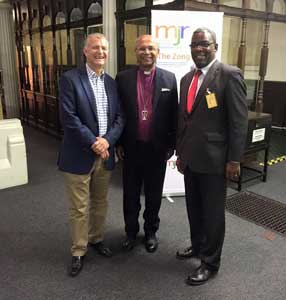 At the launch, MJR Trustees outlined the way in which this forgotten part of Britain's history has influenced many areas of today's society. Responses were made by Karen Bradley MP (Home Office Minister for Preventing Abuse and Exploitation); Stephen Timms MP (Shadow Cabinet Minister for Work and Pensions); and Bishop Michael Nazir-Ali (see right, centre), President of OXTRAD (The Oxford Centre for Training, Research, Advocacy and Dialogue).
At the launch, MJR Trustees outlined the way in which this forgotten part of Britain's history has influenced many areas of today's society. Responses were made by Karen Bradley MP (Home Office Minister for Preventing Abuse and Exploitation); Stephen Timms MP (Shadow Cabinet Minister for Work and Pensions); and Bishop Michael Nazir-Ali (see right, centre), President of OXTRAD (The Oxford Centre for Training, Research, Advocacy and Dialogue).
The launch was described as "a wonderful start on the road to raising public awareness of the legacy of slavery". The 'Case for Legacy' will be presented to a cross-party group in Parliament in November. Further projects, research and events are planned for 2016.
More details of the work of MJR can be found on www.mjr-uk.com.
Germany Under Judgment
Clifford Hill surveys the Volkswagen scandal and asks: is God saying something to Germany - and to us?
Germany, the political and economic driver of Europe, has suffered one blow of dismay and humiliation after another in the past month. The country was still struggling with the fallout from their controversial migration policy when the Volkswagen scandal struck. What's going on in Europe's leading nation? Is there any prophetic significance in these events?
The Volkswagen Scandal
Volkswagen, the world's leading car manufacturer, has admitted that some 11 million of their cars distributed around the world have been fitted with a cheating device that gives a false reading of its engine efficiency when on the test pad. It cuts the emission of pollutants while the car is being tested but once out on the road the car can spew poisonous gases into the air, including nitrogen oxides, in amounts 40 times higher than regulation emissions standards.
So far investigations have been restricted to Volkswagen, but the spiralling scandal has led to calls for cars from other manufacturers to be checked for carrying similar devices deliberately designed to cheat when the cars are being tested. US authorities, who broke the news that they had discovered the sophisticated software which turns off pollution emissions on the test pad said that VW had admitted equipping about half a million cars in the United States. VW then admitted some 2.8 million cars in Germany also had the devices and that others have been distributed throughout Europe including in Britain.
Bankruptcy Threatened
The revelations, with their potential of creating the world's biggest corporate scandal, immediately hit the value of VW's shares. Some €25 billion, about 40%, was wiped off VW's share price in just two days. The US Government added to Volkswagen's woes by announcing that they would levy fines of $18 billion. But this is only the start of the cost to VW which may result in diesel engines no longer being used for domestic cars. It is a crippling blow to the worldwide sales of VW cars which include Audi, Seat and Skoda models, that could bankrupt the firm creating massive workforce redundancies that will affect the German national economy.
Blow to Pride
The VW revelations have dealt an enormous blow to German pride: Volkswagen is a national symbol of German character and has strengthened their economy since World War II.
The Volkswagen revelations not only have financial implications; they have dealt an enormous blow to German pride. Volkswagen is not just a carmaker; it is a symbol of the national character of Germany. Volkswagen began producing a 'People's car' in the Nazi era and played a significant role in the recovery of the German economy after World War II. It became the ambition of every German family to own a VW and the company's worldwide success symbolised the prosperity of the nation enabling it to exercise both economic and political power in Europe.
Suddenly all this prosperity and pride is now threatened. Germany has dominated the councils of the EU, successfully persuaded a group of nations to join the euro club putting their national economies under the control of the European Central Bank (mainly under German control), and forced crippling austerity programmes upon those with weaker economies. Now it is Germany's turn to be worried about their national economy and there are many Europeans who will say that they are getting their comeuppance.
London's Reputation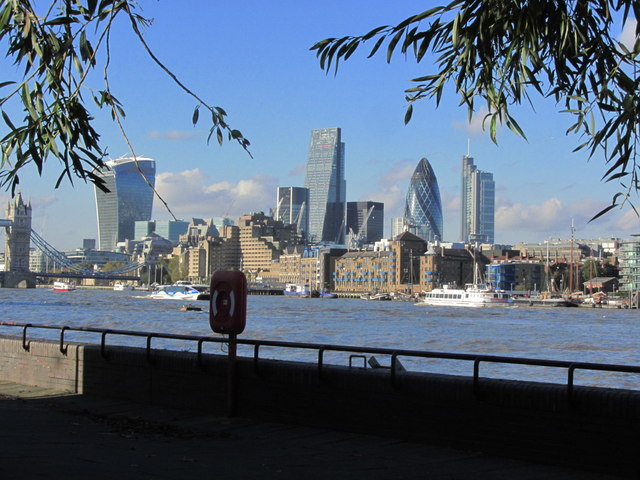 London's financial heart - once a centre renowned for business integrity.
London's financial heart - once a centre renowned for business integrity.
But we in Britain are in no place to point the finger. We too have suffered enormous blows to our national pride through cheating. Our bankers used to have a worldwide reputation for honesty in the days when London was renowned for business integrity and deals could be made on the basis of word-of-mouth and a handshake, without even reading the small print. That reputation for honesty has disappeared in a cesspit of banking scandals, Libor rate fixing, and massive rewards paid to failed executives.
It is not only in the world of finance that cheating has been exposed; our great parliamentary tradition that used to be the envy of the world has been humbled by the exposure of cheating by Members of both Houses of Parliament, with scandals involving their expenses and allowances, and selling their services for commercial gain.
The catalogue of cheating exposures does not end there but has included the sexual abuse of children and other scandals by celebrities and leaders in church and state that have shaken the nation.
We in Britain are in no place to point the finger at Germany, having suffered enormous blows to our national pride through cheating.
The Western World
Other European nations have also had their shocks and similarly in the United States cheating and corruption have been exposed, leading to the downfall of mighty financial institutions. So what's going on throughout the Western world among nations who share the Christian faith and a long biblical heritage?
Surely, the plain answer is that as nations we have deliberately turned our backs upon the word of God that historically has provided trustworthy foundations for personal and social morality. The spiralling revelations that have been shaking the nations throughout the past 40 years coincide with the increasing secularisation of the nations and the abandonment of biblical values. All of these things are prophesied in the Bible that speaks of a great shaking of the nations and a time of international turmoil and conflict.
Warning Signs
The revelations of cheating in the nations are not just coincidental, they are warning signs urging us to change course before bringing disaster upon our generation. The revelations are the deliberate action of God turning on the light to expose evil. His major purpose is to bring his salvation to the nations rather than to bring judgement.
Uncovering corruption is a salutary warning of the consequences of abandoning truth and deliberately turning upside-down the moral values which are part of God's act of creation.
Uncovering corruption is a salutary warning of the consequences of deliberately up-ending the moral values which are part of God's act of creation.
The word of God to our generation is "Woe to those who call evil good and good evil, who put darkness for light and light for darkness, who put bitter for sweet and sweet for bitter. Woe to those who are wise in their own eyes and clever in their own sight...For they have rejected the law of the Lord Almighty" (Isa 5:20-24). The future history of the world depends upon whether or not we will take note of the warning signs!


